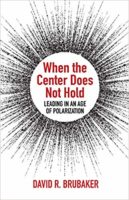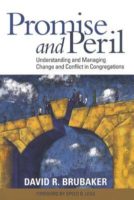
Most Americans were surprised by the outcome of the November 8 election. Congregational leaders faced a dilemma the following weekend: How does one speak both to those who are celebrating and those who are grieving?
More than 90% of Clinton supporters and a plurality of Trump supporters expected Clinton to emerge victorious. When the Electoral College was called for Trump early Wednesday morning, stunned grief set in for some and surprised delight for others. And what about the more than 90 million eligible voters who didn’t vote on November 8, representing more than 40% of total eligible voters? While many nonvoters may be apathetic or disillusioned, others feel either elated or despondent. How should congregational leaders respond to this paradoxical public reaction?
Rabbi Daniel Zemmel of Temple Micah in Washington DC directly addressed the grief and despair that many of his congregants were expressing. “We have just lived through a bruising political season where the results feel to many of us like a repudiation of the values that we believe this country was founded on and embraced,” Zemmel lamented. “Tolerance. An open mind. A spirit of generosity. A belief that we are all created in God’s image.” Rabbi Zemmel plans to lead his Reform congregation in civil disobedience if the new administration carries out some of the actions the President-elect has threatened to undertake, such as a registry of all Muslims.
Rev. Ronnie Floyd, senior pastor of Cross Church in Arkansas and a member of Trump’s evangelical advisory board, responded differently. Rev. Floyd issued a written statement after Trump’s surprise victory, urging his flock to “rebuild and to reconcile, to lock arms with our fellow Americans and work with our elected officials for a better future. We must remember that the task of protecting our rights to life and religious freedom is as much the responsibility of the average American as it is of the individual sitting in the oval office.”
Self-sorting congregations
As these differing responses show, congregations have become more politically homogenous in recent decades. Congregants can usually sense whether a congregation is primarily politically conservative, progressive, or somewhere in between, and may affiliate in part on that basis. As Jason Husser, a graduate student at Vanderbilt, wrote recently, “People whose political preferences clash with the dominant political direction of a [congregation] become less involved with that [congregation]. Conversely, participation increases among those whose politics resonate with the dominant political positions espoused in and about [that congregation].”
Although a decade old, my dissertation research found that fights over ordination of individuals in same-sex relationships played out primarily at the judicatory and denominational level—not within the local congregation. Generally, entire congregations vote to leave or remain with a denomination without splitting the congregation itself. This supports Husser’s claim that congregations tend to self-sort according to members’ values and preferences on a variety of social and political issues.
What is a rabbi, pastor, or priest to do in the face of these socio-political realities? Here are three suggestions for assessing and leading your congregation in a polarized national culture.
1. Know Your Congregation
Congregational leaders develop intuitive beliefs about the underlying political preferences of most of their congregants, but such beliefs are generally incomplete and may be wrong. The voices most likely to be heard are the cries of those with the strongest political convictions. The still, small voices of those who hew to the middle or stand in the minority are more likely to be overlooked.
While I’ve never conducted a congregational survey about political leanings, a variety of issues serve as proxies, including one’s stance on same-sex marriage. And top congregational leaders may discover significant insights by asking other staff or lay leaders to share their perceptions of the “lay of the land.” The maxim that “we cannot lead what we do not understand” applies to a congregation in all its complex dynamics—including the socio-political ones.
2. Stand with the Vulnerable
In the aftermath of Trump’s unexpected victory, a variety of groups that felt targeted in the white-hot discourse of the campaign season report increased feelings of vulnerability. These include recent immigrants and refugees, religious and sexual minorities, and many women and people of color. Since the Hebrew prophets and the Christian scriptures are both unequivocal about our responsibility to protect the vulnerable (defined primarily as widows, orphans, and foreign residents in the sacred texts), congregational leaders who desire to be faithful to their own tradition will remind congregants of this duty.
But “the vulnerable” in many congregations might also include those who feel marginalized from the mainstream in the congregation’s or community’s culture. Staunch Republicans in urban progressive congregations and committed Democrats in rural traditional congregations may both sense that their convictions and even their presence is rejected by the dominant culture. Congregational leaders thus have a duty to not only speak their own convictions but also to create space and give permission for those of differing convictions to speak theirs.
3. Focus on Common Ground
Survivors of this particularly vicious U.S. political season may conclude that there is no common ground left on which all can stand, but that would be a shallow reading of the results. An overwhelming majority of Americans along with leaders of both major parties are supportive of increased investment in infrastructure, greater job and educational opportunities, and reduced military adventurism abroad.
And beyond these political points of agreement, fundamental human connections abound. Every congregant is someone’s son or daughter and exists in a relational web that includes family members and friends about whom they care deeply. Every congregant also brings deep spiritual and emotional wells to their congregational participation. Shared liturgies, music, and artistic experiences connect congregants whose political convictions diverge.
There is much that divides and marginalizes in this country. But there is even more that unites and empowers. Religious congregations may offer the greatest hope for rebinding the brokenness that this election season produced. We will do so by knowing our congregations, standing with the vulnerable, and focusing on common ground.
David Brubaker has consulted with organizations and congregations in the U.S. and a dozen other countries on organizational development and conflict transformation. He is the author of Promise and Peril, on managing change and conflict in congregations, and When the Center Does Not Hold, on leading in an age of polarization. David serves as Dean of the School of Social Sciences and Professions at Eastern Mennonite University and is a professor of organizational studies.


